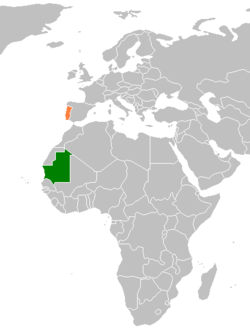Mauritanian-Portuguese relations

|
|
|
|
|
| Mauritania | Portugal |
The Mauritanian-Portuguese relations describe the intergovernmental relationship between Mauritania and Portugal . The countries have had direct diplomatic relations since 1975.
Today's relationships are comparatively weak, the cooperation in the 5 + 5 dialogue should be mentioned . Historically, the Portuguese presence is to be mentioned after the arrival of the Portuguese seafarers in the middle of the 15th century, who set up bases here on their later sea route to India , especially on Arguin .
In 2014, five Portuguese citizens were registered as consular in Mauritania. In 2016, 25 citizens of Mauritania were registered in Portugal.
history
The country name of Mauritania goes back to the Saharan tribe of the Moors . The Moors Islamized after the 7th century founded the Almoravid Empire at the beginning of the 11th century , which extended to the Iberian Peninsula in the 11th and 12th centuries and thus also ruled today's Portugal.
Portuguese expansion along the African coast began in the 15th century. In 1441 the Portuguese navigator Nuno Tristão sailed around Cabo Branco off the coast of Mauritania, which was previously considered impassable. On the island of Arguin , located below the cape, the Portuguese founded a trading base in 1445, from which they built up their African trade. Between 1455 and 1461 they built a stone fort in Arguin, the first of many fortresses in Portugal in Africa.
For their trade route inland, the Portuguese then set up several trading posts, especially in Ouadane from 1487 onwards. With the decline in Portuguese trade here in the 16th century, the trading posts were abandoned or conquered.
In 1633 the Portuguese rule on Arguin ended with the conquest of the fort by the Dutch. Even after that, the island remained a port of call for seafarers from Portugal, especially those from Madeira .
After that, the poorly accessible Mauritania offered hardly any incentives for the European colonial powers. In the course of the “ Race for Africa ” France had become the colonial power of the surrounding areas and finally subjugated Mauritania at the end of the 19th century. It remained French until it gained independence in 1960.
No official relations developed with the colonial Salazar dictatorship in Portugal. Only after the Carnation Revolution in 1974 and the subsequent end of the Portuguese Estado Novo regime did the conditions change: the new Portuguese government ended the colonial wars, released its previous colonies into independence in 1975 and realigned its international relations.
On March 3, 1975, Mauritania and Portugal entered into diplomatic relations. On 27 January 1976 accredited to João de Sá Coutinho Sotto Maior , the Portuguese ambassador to Guinea-Bissau , as the first Ambassador of Portugal in Mauritania.
After that, no more intensive contacts developed, nor did the countries set up any mutual embassies.
diplomacy
Portugal does not have its own embassy in Mauritania, the country belongs to the administrative district of the Portuguese embassy in the Senegalese capital Dakar . An honorary consulate of Portugal has been set up in the Mauritanian capital Nouakchott .
Mauritania also does not have its own embassy in Portugal; its representation in Paris is responsible for Portugal. There is a Mauritanian honorary consulate in the Portuguese capital, Lisbon.
economy

The Portuguese Chamber of Commerce AICEP does not have a branch in Mauritania; the AICEP office in the Senegalese capital Dakar is responsible.
In 2016, Portugal exported goods worth 9.103 million euros to Mauritania ( 2015 : 9.377 million; 2014 : 20.876 million; 2013 : 26.366 million; 2012 : 29.496 million), 23.5% of which were machines and equipment, 15.5% chemical-pharmaceutical products, 13.3% metal goods, 13.3% minerals and ores, 13.1% fuels and 5.8% food.
In the same period, Mauritania delivered goods worth EUR 6.114 million to Portugal ( 2015 : 8.172 million; 2014 : 19.911 million; 2013 : 7.615 million; 2012 : 15.433 million), of which 83.1% were mussels and other molluscs , 11.2% crustaceans and 5.7% fish (frozen and canned).
In 2016, Mauritania ranked 104th as a buyer and 106th as a supplier for Portuguese foreign trade, and in 2015, Portugal ranked 12th as a buyer and 44th as a supplier.
Web links
- Overview of the diplomatic relations between Portugal and Mauritania at the Diplomatic Institute of the Portuguese Ministry of Foreign Affairs
Individual evidence
- ↑ Overview of diplomatic relations with Mauritania at the diplomatic institute in the Portuguese Ministry of Foreign Affairs , accessed on May 4, 2019
- ↑ Website on Mauritanian-Portuguese migration (Table A.3) at the Portuguese Scientific Observatório da Emigração , accessed on June 18, 2017
- ↑ Official Portuguese Aliens Statistics by District , Portuguese Aliens and Borders Authority SEF, accessed on December 26, 2017
- ^ Entry on Arguin on the Gulbenkian Foundation 's Portuguese Heritage website , accessed December 26, 2017
- ↑ List of Portuguese missions abroad (under Mauritânia ), website of the Portuguese Ministry of Foreign Affairs, accessed on June 18, 2017
- ↑ Entry by the Mauritanian Honorary Consulate in Lisbon on www.embaixadas.net, accessed on June 18, 2017
- ↑ a b c Bilateral economic relations between Portugal and Mauritania , Excel file retrieval from the Portuguese Chamber of Commerce AICEP, accessed on December 26, 2017


